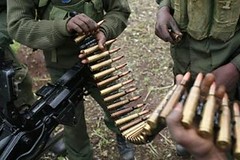
Congolese soldiers load their weapons during clashes on the outskirts of Goma in November 2008. Congolese government representatives and Laurent Nkunda's rebels will meet in Nairobi on December 8 to "formalise" a ceasefire.
Originally uploaded by Pan-African News Wire File Photos
(AFP) - - Democratic Republic of Congo government and rebel negotiators will meet in Kenya at the start of next week to formalise an uneasy ceasefire, Kinshasa's foreign minister announced on Friday.
After two days of talks with his Rwandan counterpart Rosemary Museminali, Congolese Foreign Minister Alexis Thambe Mwamba also said that a plan had been agreed with Rwanda to fight enemies of Kigali operating in troubled Nord-Kivu.
A diplomatic source told AFP that neither President Joseph Kabila nor rebel leader Laurent Nkunda would attend the first direct talks on Monday between the warring sides since renewed hostilities broke out in August, displacing well over a quarter of a million people.
"A meeting will take place between representatives of the government of DR Congo and the CNDP (National Congress for the Defence of the People), under the auspices of the United Nations and the mediator on December 8 in Nairobi," Mwamba said.
Adding that the aim was to "formalise the ceasefire" declared unilaterally by Nkunda's rebels at the end of October -- since broken by both sides -- Mwamba added that the parties would "discuss a roadmap towards peace."
Nkunda, a Tutsi who claims to be defending his people against the Rwandan Hutus, has long demanded direct talks, whereas Kinshasa had held out for negotiations involving the plethora of armed groups in the region.
Friday's announcement followed two visits to the country by UN mediator Olusegun Obasanjo, the former president of Nigeria, who has twice met separately with both Kabila and Nkunda.
A joint statement by Mwamba and Museminali said that Kigali and Kinshasa had agreed on military cooperation targeting Rwandan Hutus who fled to DR Congo after a Tutsi rebellion took control in Rwanda in the wake of the country's genocide 14 years ago.
Some 800,000 mainly Tutsis were killed by Hutu extremists in a three-month orgy of killing in 1994.
"The two sides have drawn up a detailed plan of operations against ex-soldiers of the Rwandan armed forces, Interhamwe militia and Democratic Forces for the Liberation of Rwanda (FDLR)," a joint statement said.
Kigali has demanded for years that Kinshasa disarm the Hutus, which Nkunda claims are being supported by Congo government forces. Kinshasa for its part accuses Kigali of backing Nkunda's rebellion, which Rwanda denies.
The two foreign ministers, who met in the Nord-Kivu capital of Goma, also said their respective governments wished to continue normalising relations between the two neighbours, including reopening embassies.
According to a diplomatic source in Goma, the military operation against the FDLR would begin early in the new year and would be jointly led by the UN peacekeeping force known as MONUC and the Congolese army, with "significant" input from the Rwandans.
The Rwandan army would provide logistic, intelligence and other support but "the idea is to avoid the deployment of Rwandan troops on Congolese soil," the source stressed.
Rwanda sent troops across the border in 1996-97 and between 1998 and 2002 in support of rebels, using as a pretext the presence of the FDLR.
The vast territory of Congo, formerly known as Zaire, has been the theatre of conflict since the overthrow of dictator Mobutu Sese Seko in May 1997 by Kabila's father, Laurent, with the country's neighbours being drawn in by the prospect of rich natural resources.
The UN refugee agency said Friday that more than 90,000 people were missing after three makeshift refugee camps in rebel-held areas of Nord-Kivu were found empty.
No comments:
Post a Comment